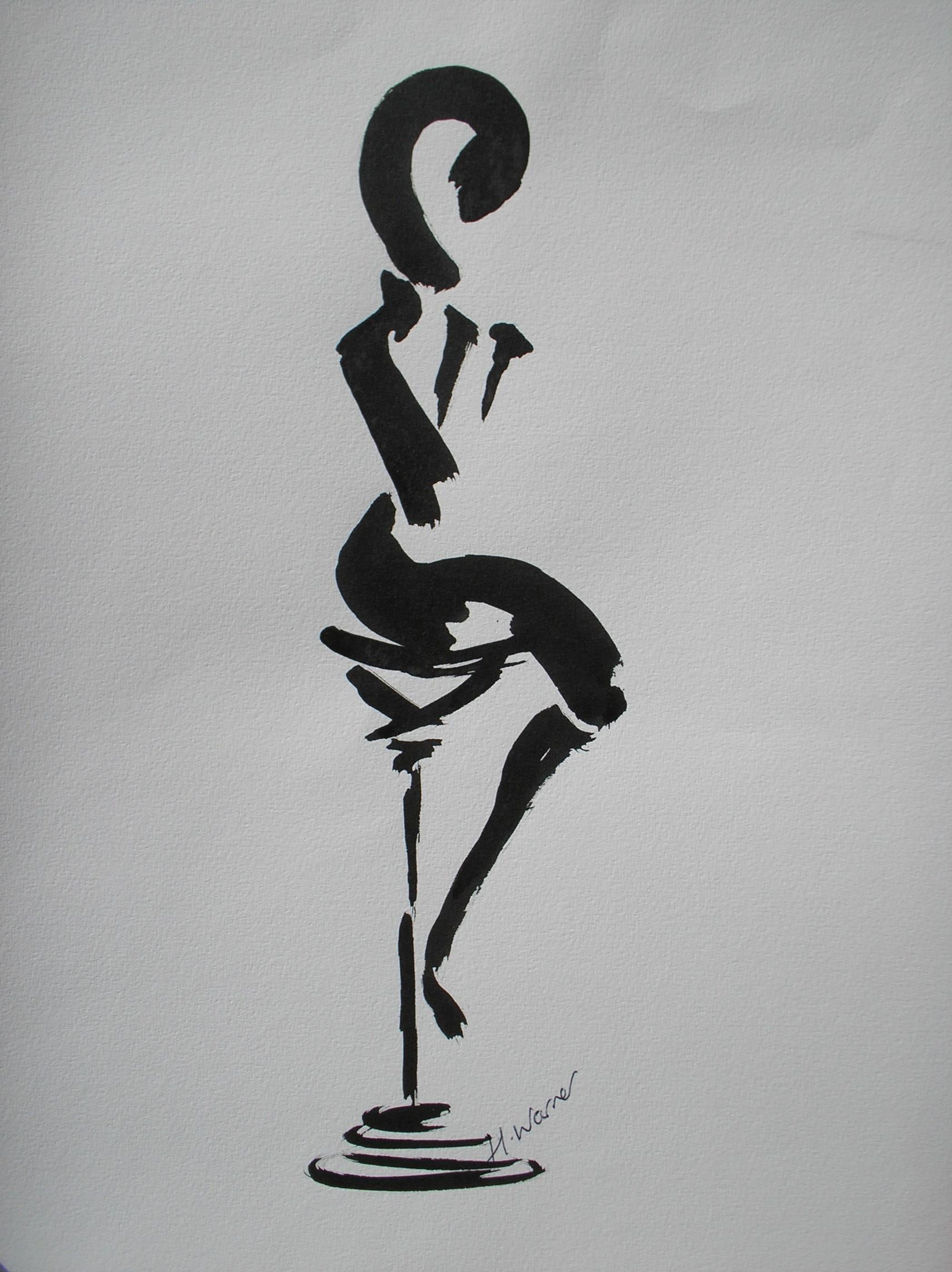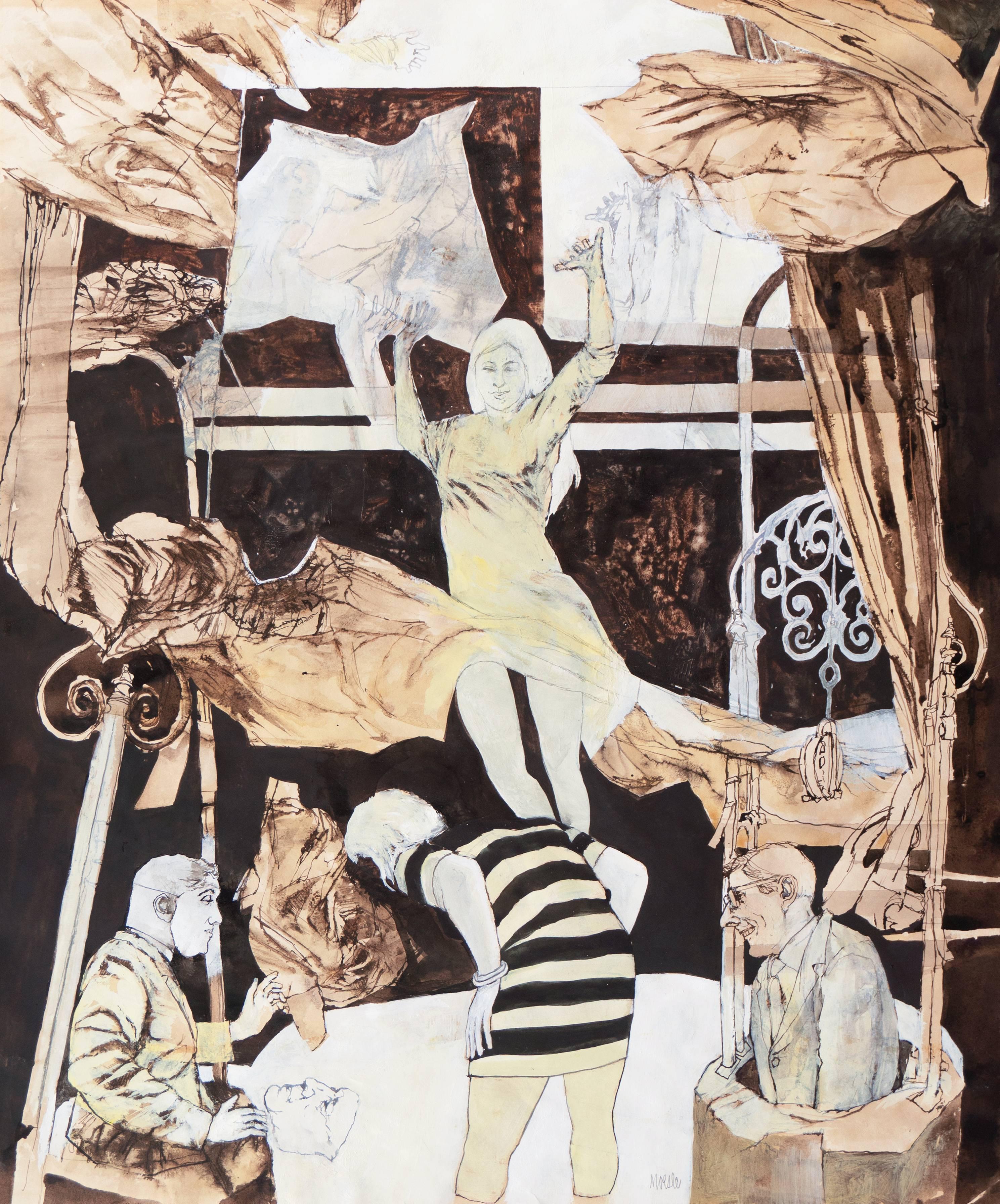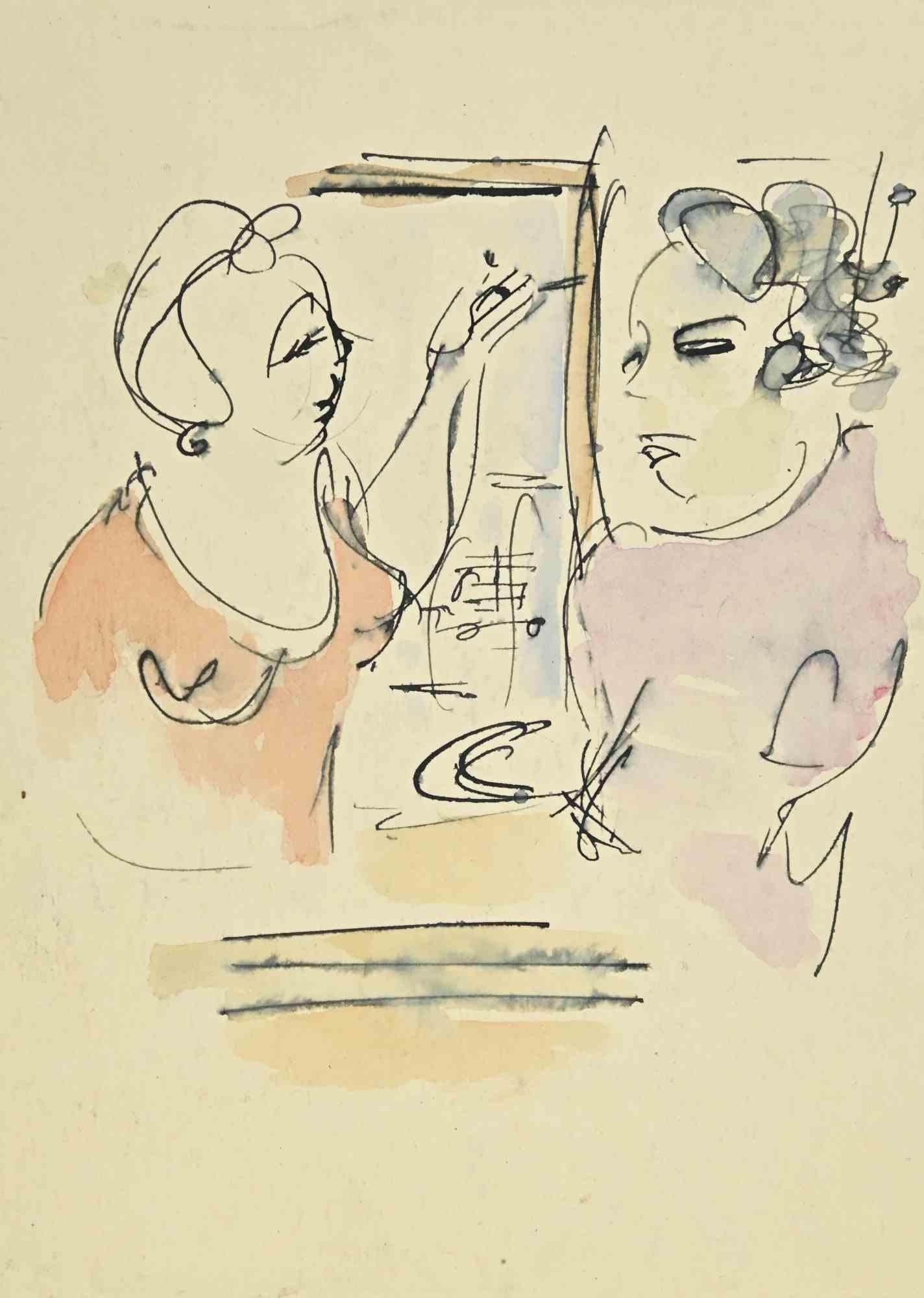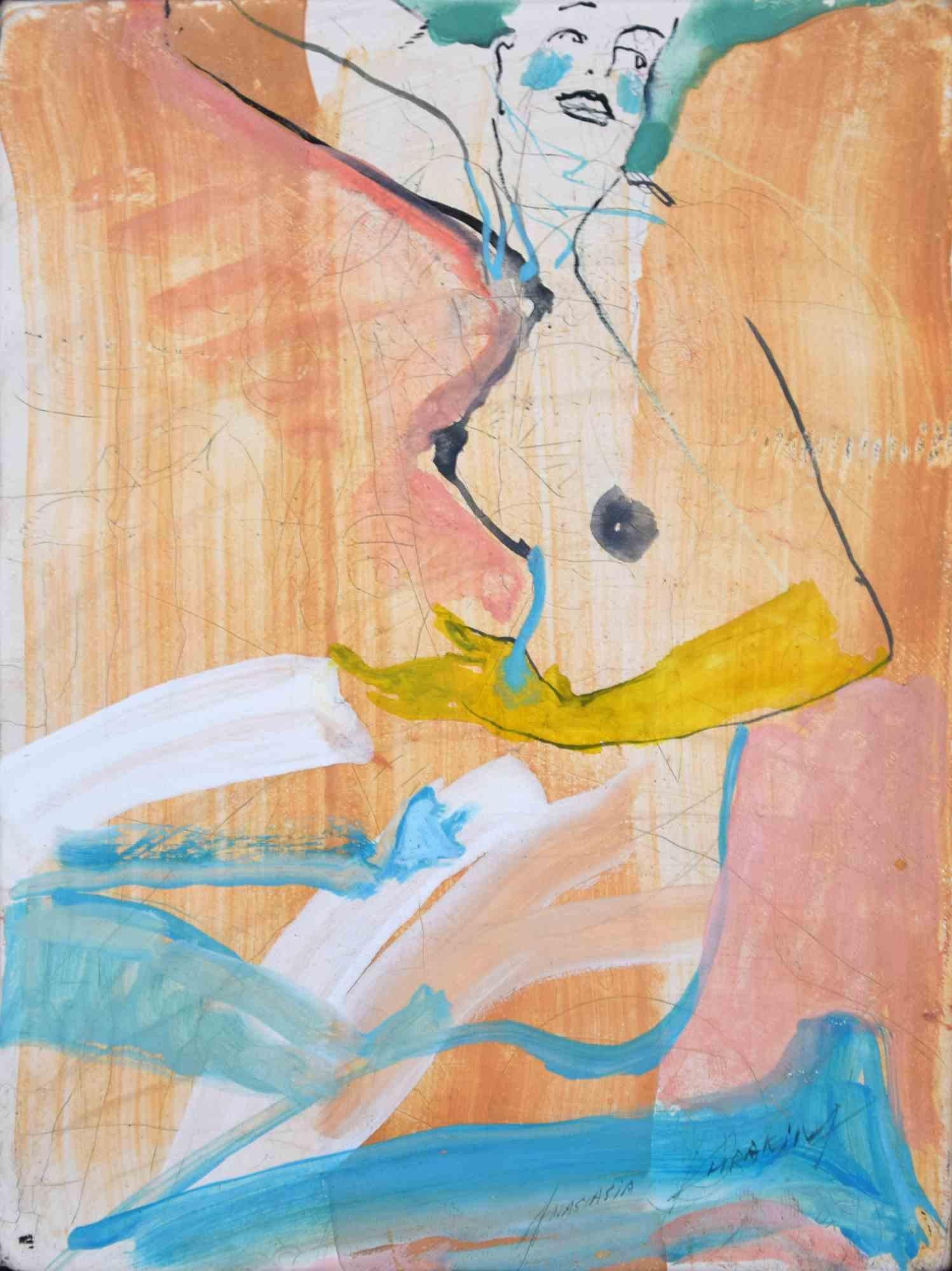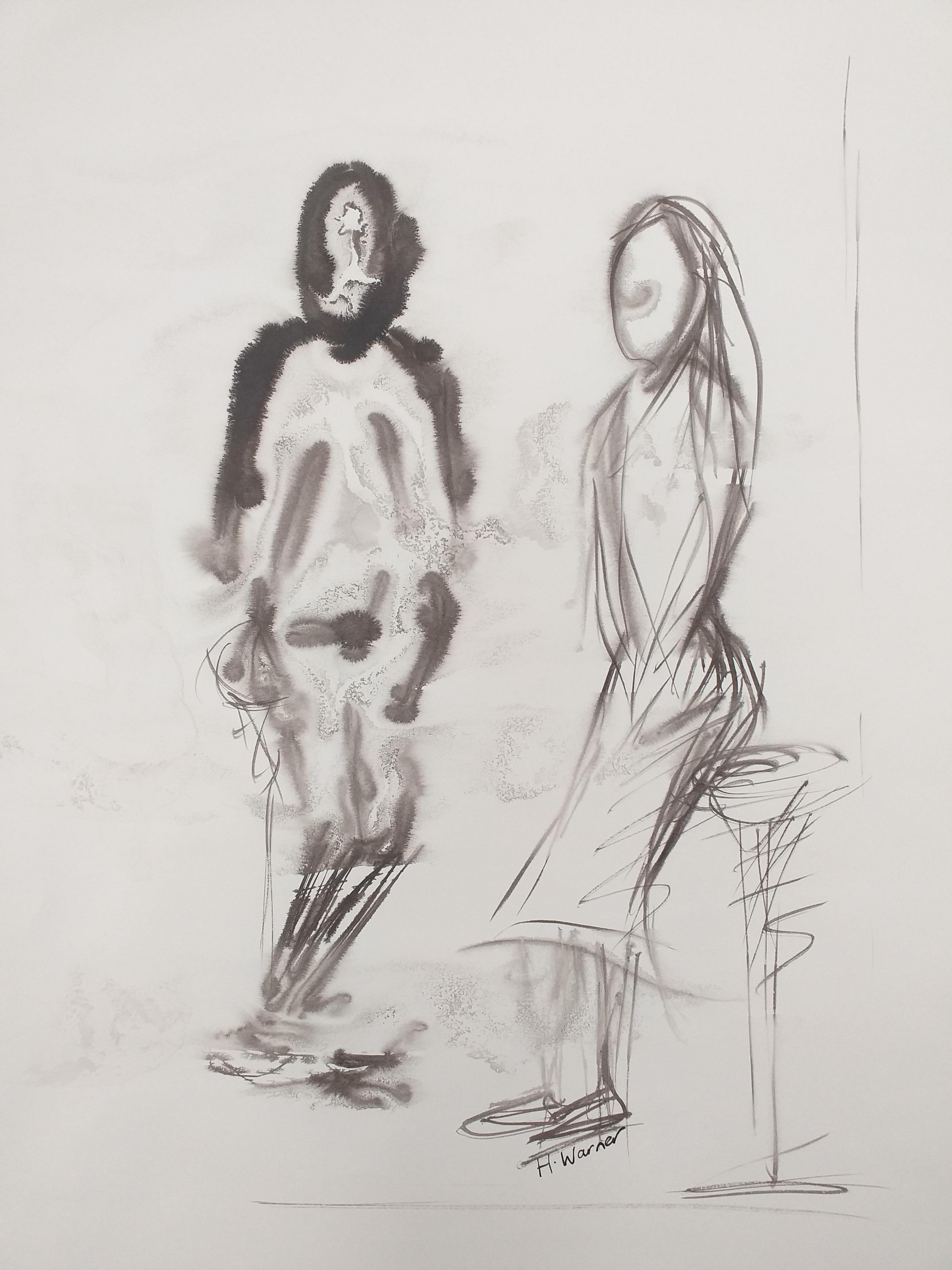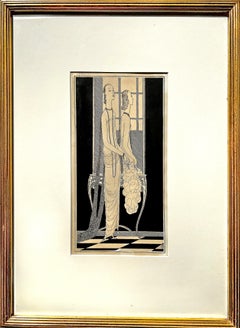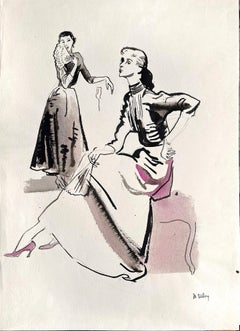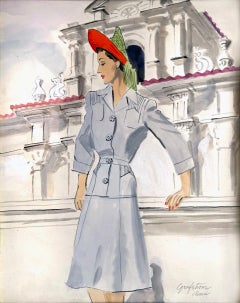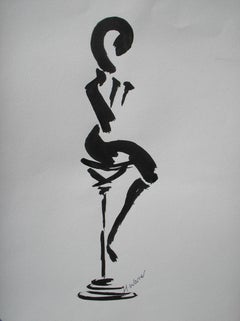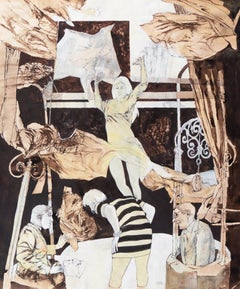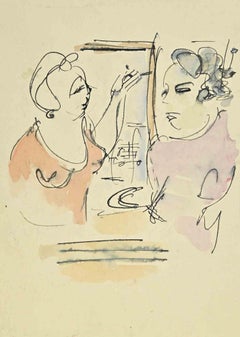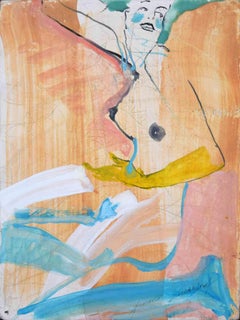Objekte ähnlich wie Kritikerin - Weibliche Connosieurs – Schottische weibliche Künstlerin Illustratorin
Möchten Sie mehr Bilder oder Videos?
Zusätzliche Bilder oder Videos von dem*der Anbieter*in anfordern
1 von 14
Helen Paxton BrownKritikerin - Weibliche Connosieurs – Schottische weibliche Künstlerin Illustratorin1915 - 1925
1915 - 1925
10.857,95 €
Versand
Angebot wird abgerufen …Das Versprechen von 1stDibs:
Authentizitätsgarantie,
Geld-Zurück-Garantie,
Stornierung innerhalb von 24 Stunden
Angaben zum Objekt
Two young Scottish women wear smart business jackets and fashionable tartan skirts. They are depicted as discerning Art Connoisseurs evaluating a small bronze dancer. The Artist Helen Paxton Brown incorporates them at the top of a composition of stacked silhouetted graphic arts objects, such as a sword, a wooden painter's palette with brushes, a lithographer's press and roller, bagpipes, a pen and an inkwell, a fruit-on-the-vine, and a nude male. All elements of the drawing are meticulously rendered in precise detail. The small bronze dancer, for example, is only one inch tall but is perfect in its proportion and line of action.
The work is masterfully rendered in minute detail using the finest thin black lines, showcasing extremely small and precise detail. Her composition is quite complex as well and demonstrates the remarkable technical skill of the artist.
We are unsure of the date, but the subjects' short dresses may suggest it is closer to mid-century than the turn-of-the-century. Yet all other aspects of the work suggest it is from 1915 - 1925. Despite the subject's short skirts, one could make the case that the work was executed closer to the turn of the 20th century since that was when both Jessie M. King and her friend Helen Paxton Brown were in their prime—the look and feel of the paper point to this work being around 100 years old. Clearly, the work should be celebrated for its artistic skill and for featuring women as critics, not men.
If it were done from 1915- 1925 .. that would make it more significant.
Additionally, it came from the collection of Jessie M. King who died in 1949.
Titled " The Critic," I DEDICATE THIS DRAWING TO E. A. TAYLOR, Lower center - Ernest Archibald Taylor, better known as E A Taylor, was a Scottish artist, an oil painter, watercolourist and etcher, and a designer of furniture, interiors and stained glass. He was also the husband of famed Scottish Female Illustrator Jessie M. King. . Unsigned. Framed under glass 21.25 x 15.25 . The work came from the collection of Jessie M. King who died in 1949. Pen and ink on paper with silver metallic paint highlights
From: Wikipedia
Helen Paxton Brown (1876 – 20 March 1956) also known as "Nell", was an artist associated with the Glasgow Girls. Born in Hillhead, Glasgow to a Scottish father and English mother[1] and she spent most of her life in Glasgow. Best known for her painting and embroidering she also worked in a range of mediums such as leather, book binding and also painted china.
Education and career
Brown studied at Glasgow School of Art (GSA) from 1894 to 1901 under directorship of the progressive Fra. H Newbery.[2] She was a student of Ann Macbeth at GSA and then went on to teach art embroidery to teachers at GSA from 1904 to 1907 (embroidery being an important part of GSA craft at that time) and then book binding from 1911 to 1913. It was whilst studying at GSA that she met her good friend Jessie M. King who she shared a studio flat with at 101 St Vincent Street, Glasgow from around 1898 until 1907 when King got married. The women's friendship was longlasting and strong despite the different trajectories of their careers. King attracted international acclaim but despite some early notice Brown had less success. The two women often modelled for each other and were inseparable companions during the years they lived together.[3]
After GSA Brown went to Paris to attend sketching classes and was an admirer of the free style of French Impressionists and would continue to visit Paris throughout her career. Her work mainly captures people out enjoying life, capturing atmosphere and café scenes (reflecting her interest in fashion and clothes), but she also painted landscapes and flowers too.
She is quoted as saying that she chose embroidery because she enjoyed "playing with colour" but also because it would sell as "art for art's sake is the road to starvation nowadays".[4] She was reportedly vivacious and noted for her witty wisecracks[5]
In the 1900s Patrick Geddes and Fra Newberry led a number of Scottish masques and pageants relating to Pan-Celtic events involving a range of Arts and Crafts designers from Edinburgh and Glasgow. Helen Paxton Brown was involved in the "historical" pageant production at the University of Glasgow.[6]
Exhibitions and commissions
Glasgow School of Art
Brown joined "The Glasgow Society of Artists" (started by physician Alexander Frew, husband of painter Bessie MacNicol) which women could join unlike the all-male Glasgow Art Club. Although short-lived, the society provided an alternative for those painters dissatisfied with the Glasgow establishment.[3] She was also a member of the Glasgow Society of Lady Artists from 1905 and became an honorary member in 1948 where her work could often be found as well as at the Glasgow Art Institute.
From 1920s Brown started using more bright colours and bolder designs in both her painting and embroidery. This development was shown in a joint exhibition with Jessie M. King at the Glasgow Society of Lady Artists’ exhibition in April 1931 called "Spring in Three Room"[7] which not only showed their paintings but saw them taking over three rooms which were decorated in bright yellows and creams showing different home decoration, in stark contrast to the then contemporary style of dark furniture. Jessie M. King and Paxton Brown exhibited their work on several occasions together.
In 1925 she received a commission from Mount Blow, Dalmuir to paint 12 mural panels of nursery rhymes, through the Glasgow Corporation Welfare Scheme.[8]
- Schöpfer*in:Helen Paxton Brown (1876 - 1956, Schottland)
- Entstehungsjahr:1915 - 1925
- Maße:Höhe: 35,56 cm (14 in)Breite: 20,66 cm (8,13 in)
- Medium:
- Zeitalter:
- Zustand:some yellow to the paper and a few scatters spots of foxing in the lower quadrant - commensurate with age, Otherwise presents quite well.
- Galeriestandort:Miami, FL
- Referenznummer:1stDibs: LU385316370442
Anbieterinformationen
4,9
Gold-Anbieter*in
Premium-Anbieter*innen mit einer Bewertung über 4,3 und 24 Stunden Reaktionszeit
Gründungsjahr 2005
1stDibs-Anbieter*in seit 2016
115 Verkäufe auf 1stDibs
Typische Antwortzeit: 1 Stunde
- VersandAngebot wird abgerufen …Versand von: Miami, FL
- Rückgabebedingungen
Einige Inhalte dieser Seite wurden automatisch übersetzt. Daher kann 1stDibs nicht die Richtigkeit der Übersetzungen garantieren. Englisch ist die Standardsprache dieser Website.
Authentizitätsgarantie
Im unwahrscheinlichen Fall eines Problems mit der Echtheit eines Objekts kontaktieren Sie uns bitte innerhalb von 1 Jahr für eine volle Rückerstattung. DetailsGeld-Zurück-Garantie
Wenn Ihr Objekt nicht der Beschreibung entspricht, beim Transport beschädigt wurde oder nicht ankommt, kontaktieren Sie uns bitte innerhalb von 7 Tagen für eine vollständige Rückerstattung. DetailsStornierung innerhalb von 24 Stunden
Sie können Ihren Kauf jederzeit innerhalb von 24 Stunden stornieren, ohne jegliche Gründe dafür angeben zu müssen.Geprüfte Anbieter*innen
Unsere Anbieter*innen unterliegen strengen Dienstleistungs- und Qualitätsstandards, wodurch wir die Seriosität unserer Angebote gewährleisten können.Preisgarantie
Wenn Sie feststellen, dass ein*e Anbieter*in dasselbe Objekt anderswo zu einem niedrigeren Preis anbietet, werden wir den Preis entsprechend anpassen.Zuverlässige weltweite Lieferung
Unsere erstklassigen Versandunternehmen bieten spezielle Versandoptionen weltweit, einschließlich individueller Lieferung.Mehr von diesem*dieser Anbieter*in
Alle anzeigenArt Deco Frau vor einem Spiegel - Vogue Magazine-Künstlerin
Eduardo Garcia Benito, der legendäre Künstler des Vogue-Covers, stellt einen perfekt posierenden, langhalsigen Flapper mit ihrem Spiegelbild dar, Ihre extravaganten Perlenketten rei...
Kategorie
1920er, Figurative Zeichnungen und Aquarelle
Materialien
Papier, Tinte, Gouache
Art Deco Frau vor einem Spiegel - Vogue Magazine-Künstlerin
Eduardo Garcia Benito, der legendäre Künstler des Vogue-Covers, stellt einen perfekt posierenden, langhalsigen Flapper mit ihrem Spiegelbild dar, Ihre extravaganten Perlenketten rei...
Kategorie
1920er, Art déco, Figurative Zeichnungen und Aquarelle
Materialien
Papier, Tinte
Modeillustration aus der Mitte des Jahrhunderts – Neiman Marcus?
Von Marjorie Ullberg
Elegante Mode-Modelle der 1950er Jahre posieren für eine Designer-Kollektion für ein großes Kaufhaus in San Francisco - vielleicht Neiman Marcus. Nachlass-Signaturstempel unten rec...
Kategorie
1950er, Moderne, Figurative Zeichnungen und Aquarelle
Materialien
Wasserfarbe, Bleistift
Fashion Model Illustration Vielleicht für die Zeitschrift Vogue
Von Ruth Sigrid Grafstrom
Diese High-Fashion-Illustration wurde wahrscheinlich zwischen 1938 und 1940 für einen Leitartikel in einer großen Zeitung wie Vogue oder McCall's erstellt. Es zeigt Ruth Grafstroms ...
Kategorie
1930er, Amerikanische Moderne, Figurative Zeichnungen und Aquarelle
Materialien
Papier, Tinte, Wasserfarbe
Introspektive Frau / Schauspielerin im Filmset. Kunst der Mitte des Jahrhunderts, weibliche Illustratorin
Von Lorraine Fox
Lorraine Fox war eine amerikanische Illustratorin und Werbegrafikerin, die Zeitschriften, Buchumschläge und Werbung illustrierte. Zu den Magazinen, für die sie illustrierte, gehörten...
Kategorie
1960er, Post-Impressionismus, Figurative Gemälde
Materialien
Wasserfarbe, Gouache, Karton, Bleistift
Märchen vom Wunderland - Fairy Tale - Illustratorin
Wonderland Tale - Fairy Tale - Female Illustrator - Das Werk ist akribisch in einer anspruchsvollen Technik der Linie bis zum Punkt der Verwunderung gerendert. Dennoch gelingt es Bax...
Kategorie
1950er, Englische Schule, Figurative Zeichnungen und Aquarelle
Materialien
Tinte, Stift
Das könnte Ihnen auch gefallen
Britische Contemporary Art von Helen Warner - She's There
Tinte auf Papier
Helen Warner ist eine 1978 geborene britische Künstlerin, die in Southampton, Großbritannien, lebt und arbeitet. Sie hat Kunst, Sportwissenschaften und Humanbiologi...
Kategorie
2010er, Zeitgenössisch, Figurative Zeichnungen und Aquarelle
Materialien
Tinte, Papier
2.344 € Angebotspreis
14 % Rabatt
„Dynamic Figurative“, kalifornischer Postimpressionist, Ruskin School of Art
Von Robert Moesle
Signiert unten rechts "Moesle" und gemalt um 1975.
Gouache und Aquarell figurativ mit zahlreichen Figuren in dynamischer Interaktion.
Der 1932 geborene Robert Moesle studierte Male...
Kategorie
1970er, Figurative Zeichnungen und Aquarelle
Materialien
Papier, Tusche, Wasserfarbe, Gouache
Frauen – Zeichnung – Mitte des 20. Jahrhunderts
Frauen ist eine Zeichnung aus der Mitte des 20. Jahrhunderts.
Tusche und Aquarell auf Papier.
Guter Zustand mit leichten Stockflecken.
Das Kunstwerk wird durch geschickte ausdruck...
Kategorie
Mitte des 20. Jahrhunderts, Moderne, Figurative Zeichnungen und Aquarelle
Materialien
Tinte, Wasserfarbe
Eine Frau – Zeichnung von Anastasia Kurakina – 2010er-Jahre
Von Anastasia Kurakina
A woman ist ein zeitgenössisches Kunstwerk, das 2018 von der aufstrebenden Künstlerin Anastasia Kurakina realisiert wurde.
Gemischte farbige Aquarell- und Tuschezeichnung auf Tafel....
Kategorie
2010er, Zeitgenössisch, Zeichnungen und Aquarellbilder
Materialien
Wasserfarbe
Die Uhr ist mit einer Schnur versehen
Von Carlotta Costantini
Frauen ist ein Original-Kunstwerk von Carlotta Costantini mit Aquarell und Porzellantinte auf Elfenbeinpapier, signiert am unteren mittleren Rand. Perfekte Bedingungen.
Passepartout...
Kategorie
20. Jahrhundert, Moderne, Figurative Drucke
Materialien
Tinte, Wasserfarbe
Britische Contemporary Art von Helen Warner - Lady and Man
Tinte auf Papier
Helen Warner ist eine 1978 geborene britische Künstlerin, die in Southampton, Großbritannien, lebt und arbeitet. Sie hat Kunst, Sportwissenschaften und Humanbiologi...
Kategorie
2010er, Zeitgenössisch, Figurative Zeichnungen und Aquarelle
Materialien
Tinte, Papier
1.875 € Angebotspreis
15 % Rabatt
